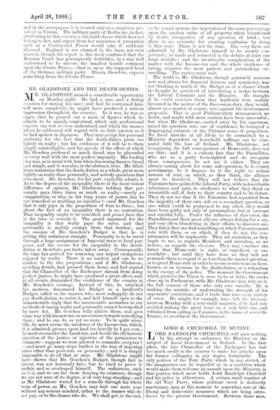MR. GLADSTONE AND THE DEATH-DUTIES. to the sound system, the
imposition of the same per-centage upon the auction value of all property when transferred by death, irrespective of any question of kind ; but there is no necessity for creating confusion by doing it this year. There is not the time. The very facts are admitted by Mr. Gladstone himself to be mostly con- jectural; he made and retracted in the debate at least one large mistake ; and the inextricable complication of the matter with the Income-tax and the whole incidence of rating, requires the most patient and painstaking un- ravelling. The matter must wait.
The truth is, Mr. Gladstone, though genuinely anxious now and always for financial fairness and symmetry, was not thinking so much of the Budget as of a chance which he thought he perceived of introducing a wedge between the Liberal Unionists and the Ministry. He thought if he could convince them that landlords were unduly favoured in the matter of the Succession-duty, they would, almost as a matter of course, vote against the Government proposals. That is good Parliamentary management, no doubt, and might with more caution have been successful ; but when Mr. Gladstone, carried away by his eagerness, raised the question into one of confidence, he betrayed a. disparaging estimate of the Unionist sense of proportion. No fiscal mistake at all likely to be committed by a Ministry dependent on household suffrage can be com- pared with the loss of Ireland. Mr. Gladstone, not recognising the full consequences of Home-rule, does not see this ; and it is a curious fact that the Parnellites, who are as a party keen-sighted and do recognise those consequences, do not see it either. They are always casting about for some side-question, be it county government, be it finance, be it the right to reduce arrears of rent, on which, as they think, the alliance must be dissolved. They will not believe that the Unionists have quitted the Liberal Party, with indescribable reluctance and pain, in obedience to what they think an irresistible call of duty to their country and to its future. They do not see that if the Unionists had separated from the majority of their own side on a secondary question, or one which could be postponed to any other, they would have been guilty not only of presumption, but of extreme and suicidal folly. Under the influence of this error, the Parnellites and their great ally are always fishing for a cry, and very often blundering in their efforts to discover one. They fancy they can find something on which Unionists must vote with them, or on which, if they do not, the con- stituencies will be implacable. They are mistaken, as they begin to see, as regards Members, and mistaken, as we believe, as regards the electors. They may convince the latter that Home-rule is right, or expedient, or un- avoidable; but until they have done so, they will not persuade them to regard it as less than the master question, or to grant Home-rule in order to secure restrictions on beer- houses, or an increase in the death-duties, or a relaxation in the energy of the police. The moment the Government which protects the Union is seen to be at stake, the ranks close up in Parliament, with, Mr. Gladstone may rely on it, the full consent of those who only vote outside. He is making the mistake of underrating the strength of his opponents' convictions, and it leads him into every variety of error. He might, for example, have left the Govern- ment on Monday with a very small majority, if he had only avoided staling the great issue on a very little one, and refrained from calling on Unionists, in the name of scientific finance, to overthrow the Government.


































 Previous page
Previous page